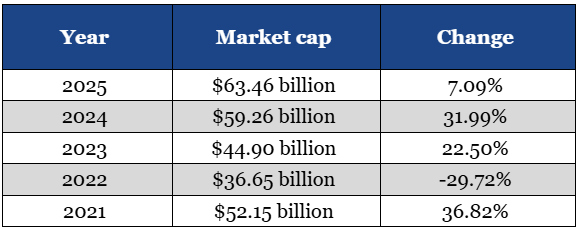What's driving CIBC stock in today's Canadian market? Check out valuable insights on indicators, performance, and what it means for your clients

The Canadian Imperial Bank of Commerce (CIBC) is one of the country’s largest banks. If you’re working as a financial advisor or aspiring to become one, understanding how CIBC stock is performing as well as its indicators is beneficial. Markets are shifting, interest rates are changing, and your clients will be looking to you for sound advice.
In this article, Wealth Professional Canada will talk about CIBC bank stock. We will look at recent figures to help you decide whether you should advise your clients to make an investment. We’ll also cover some background on CIBC and how it compares to other major Canadian banks.
Get to know CIBC
CIBC is the result of what is still deemed the biggest merger of two chartered banks in Canadian history. It was created in 1961 through the merger of the Canadian Bank of Commerce and the Imperial Bank of Canada. The former was established in 1873, while the latter was founded earlier in 1867.
CIBC is one of two Toronto-based banks that are part of the Big Five banks of Canada, the other being Toronto-Dominion Bank. CIBC is the fifth largest while TD is the second. The other three members are:
- Royal Bank of Canada (#1)
- Scotiabank (#3)
- Bank of Montreal (#4)
Each of these banks has a strong presence across the country. Together, they hold a large share of Canada’s banking and financial services market. A lot of these banks’ notable milestones are consistent growth and innovation.
This is important to look at in a bank stock. It can signify to investors that the bank is stable and consistent on its path towards long-term growth.
CIBC stock indicators
CIBC stock is a common choice for investors looking for steady income and long-term growth. Let’s look at three indicators to determine whether CIBC stock is worth investors’ time and money:
- market cap
- P/E ratio
- P/B ratio
Let's discuss them at length below:
1. Market cap
As of 2025, CIBC has a market capitalization of $63.46 billion. Let’s look at its market cap performance for the past five years:

From this table, we can see that CIBC’s market cap dropped nearly 30% in 2022. One possible reason is concern over its limited diversification, especially its focus on the Canadian housing market.
That year, Canada’s housing sector faced rising prices and higher rental costs. These changes placed financial pressure on many homeowners and renters. They also likely increased the risk of loan defaults and affected investors’ behaviour. CIBC’s market cap drop in 2022 might’ve reflected such concerns.
The good news is that CIBC has bounced back over the past few years. Historically, CIBC’s resilience shows that it can be a good stock in terms of its market cap. Still, your clients should note its sensitivity to upsets in the Canadian housing market.
2. P/B ratio: 1.50
CIBC has a price-to-book (P/B) ratio of 1.50. This suggests that investors are paying 1.5 times the company's net asset value. While this isn't considered particularly low, it reflects a reasonable valuation, especially when compared to higher P/B ratios in the industry.
A lower P/B ratio doesn't automatically mean a stock is undervalued. Your clients should also consider other factors like its dividend history and overall financial health.
For instance, CIBC has shown consistent dividend payouts and maintains a solid return on equity. These are positive signs if your clients want to invest in this bank stock.
3. P/E ratio: 12.4
CIBC has a price-to-earnings (P/E) ratio of around 12.4. This is lower than average for the broader market, which often ranges from 20 to 25. A lower P/E ratio can mean that the stock is undervalued, especially if the company is still making strong profits.
In the case of CIBC, the positive and relatively low P/E ratio might suggest that the bank is earning well compared to its share price. This makes it a potentially attractive option for value-focused investors.
On the other hand, a very high P/E ratio could mean a stock is overpriced based on future expectations. A negative or near-zero P/E usually means the company is not profitable and is reporting losses.
So, while CIBC’s P/E ratio alone doesn't guarantee a good investment, it does point to solid earnings at a reasonable valuation. This is especially true when combined with its dividend strength and financial stability.
Is CIBC bank stock worth investing in?
CIBC stock experienced notable fluctuations in 2025. After a strong performance in 2024, with a 43 percent rally, the stock pulled back by 9 percent in early 2025, trading around $82.99.
This volatility is partly due to CIBC's exposure to the Canadian housing market. The bank's focus on domestic lending, particularly in mortgages, means its performance is closely tied to real estate market conditions.
While the housing sector faced challenges during the pandemic, there are signs of recovery in 2024 and 2025, with expectations of increased demand as interest rates stabilize.
CIBC stock dividends
In terms of dividends, CIBC has shown a commitment to returning value to shareholders. It has increased its quarterly dividend to $0.97 per share for the quarter ending in January 2025. This move can be interpreted as CIBC’s confidence in its earnings and financial stability.
CIBC stock offers potential for long-term growth and income, especially for those who are comfortable with its exposure to the housing market. If your clients hold CIBC shares, they might want to consider maintaining their position.
On the other hand, new investors should assess their appetite for risk and investment objectives before purchasing. Watch this video to learn more about CIBC stock performance in 2025:
You should also tell your clients that CIBC was recently included on this list of Canadian bank stocks worth investing in.
Investing in CIBC bank stock
CIBC appears to be performing well in terms of overall performance, ranking second among Canada’s biggest banks. Its pre-tax profits went up by 32 percent in 2024, showing steady growth and strong financial results.
Depending on your clients’ goals and risk tolerance, CIBC stock can be a good choice for long-term growth and steady income. Those who already own CIBC shares might want to keep them, as the bank continues to show strength in important areas.
Another strategy for your clients would be to invest in CIBC stock and in other bank stocks. Just make sure that they’re also stable and doing well. Investors can even mix it up with shares of TD Bank or Royal Bank of Canada.
You can check out this guide if your clients would like to invest in other Canadian bank stocks with better growth and returns.



